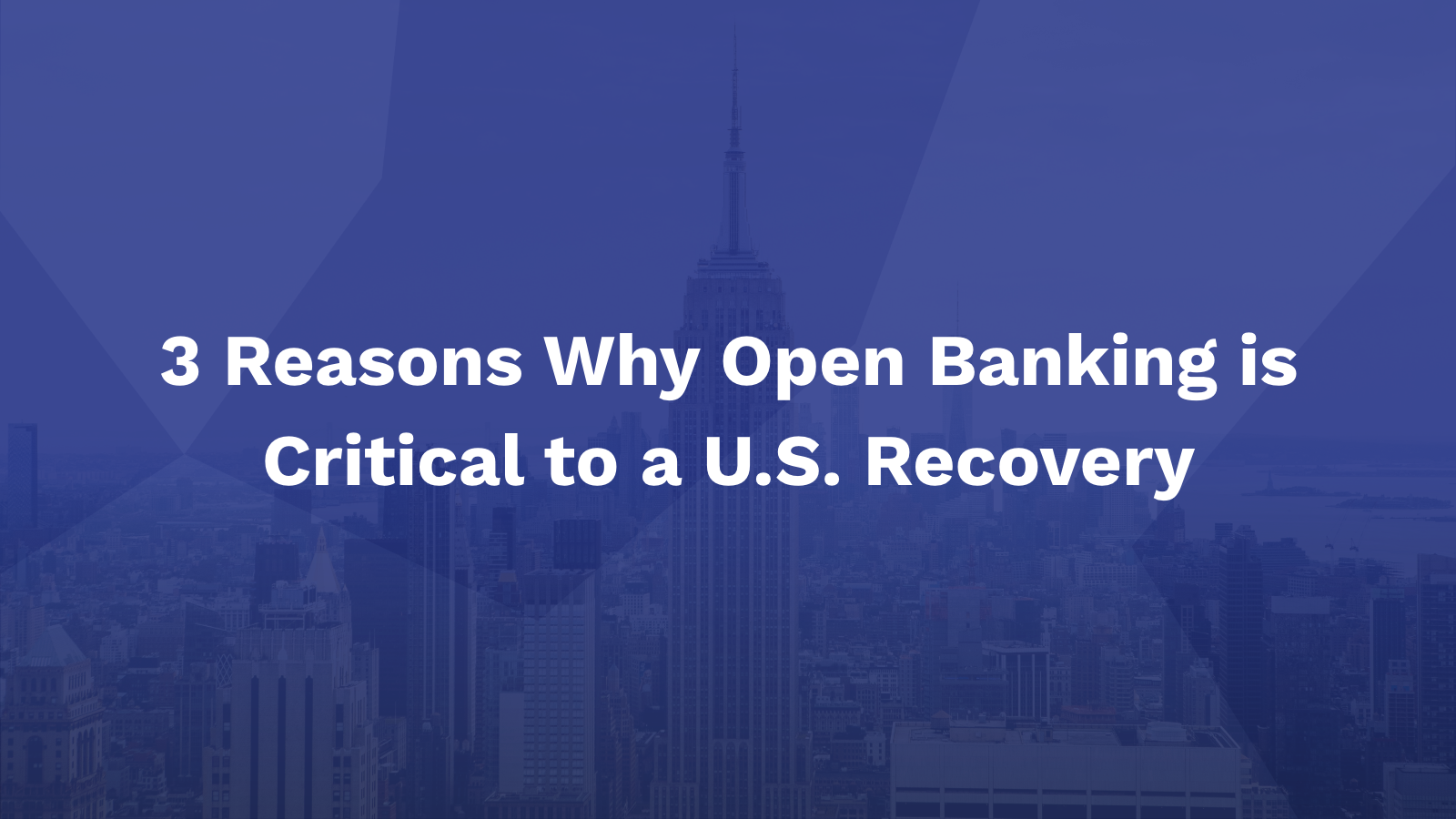
3 Reasons Why Open Banking is Critical to a U.S. Recovery
There is no shortage of ideas around how to incite post-pandemic economic growth. From infrastructure investments to increasing immigration to boosting research and development, everything is on the table. However, there is one growth-accelerating option that hasn’t been widely discussed: Embracing open banking.
Open banking, which we have written about before, is a practice or idea where third-party fintechs get access to consumer banking, transaction and financial data from banks and other institutions through the use of application programming interfaces (APIs). Essentially, it allows fintechs and other companies to easily access financial data – credit scores, bank account information, mortgage details and much more. This access to client data can then allow banks to enhance the entire consumer experience in a shorter period of time, targeting inefficient and manual processes such as vendor payments and reconciling bank statements. Imagine if a small business could access all of its bank, investment, insurance and mortgage accounts through a single mobile app.
Here's an excerpt of an If I Ran the Bank podcast episode where FISPAN's CEO Lisa Shields describes the difference between Open Banking and Embedded Banking:
While its main objective is to make individuals’ and companies’ lives easier, many experts also think it could boost economic growth around the world. According to a 2018 PYMNTS article, open banking in the U.K. (where this type of data sharing is now mandated by the government), could add $1.4 billion to its GDP annually.
Given the economic benefits of open banking, governments and businesses around the world should consider adopting it sooner in an effort to increase post-pandemic GDP growth. How could it help? Here are three ideas.
1. It can help small businesses get easier and quicker access to loans
Small businesses are the core of every country’s economy. In the U.S., small businesses account for two-thirds of net new jobs and 44% of its economic activity. Yet, traditional financial institutions are loaning far less to small operations than ever before, with banks holding 5.7% fewer small business loans in 2019 than in 2007. It is clear that SMBs hold a great untapped opportunity for banks, yet hesitance revolving around costs and risks have led banks the other way. To learn more about this, read our article here.
Fortunately, a number of fintechs are trying to fill the void, but companies must still fill out paperwork and wait a few days before getting approved – precious time in a pandemic. If open banking existed in the U.S., a fintech could instantly ask an entrepreneur’s bank for their financial information and then pinpoint the product they need most. The more money that small businesses can access, and the faster they can get those dollars, the sooner they can hire, spend and get back to work.
2. It can create healthier, more viable businesses
As companies grow, they tend to need all kinds of financial products, including bank accounts, investment accounts, insurance, mortgages and much more. In many cases, traditional banks only offer some of these options, or because of their closed ecosystem, they offer them at less- than-ideal rates. Since business owners don’t have the time to shop around, they’ll just go with whoever they’re already dealing with or not get the product they need at all.
With open banking, accessing different products from different vendors is much easier to do. Rather than having to contact multiple institutions, you could compare prices online and then sign up without having to fill out multiple forms, since they can all share your information with one other. You can then view, access and interact with all of your accounts – no matter the product – using a single app. If that were the case, companies would get the products they need to effectively run a business, and at a lower cost, which would ultimately put them in a much better financial position.
3. It can help create a larger, stronger financial industry
The big benefit of open banking is that it allows for many more connections within the financial industry. If it becomes easier to issue financial products and services, then a greater number of fintechs with more innovative products would pop up. Rather than eat into the big banks’ market share, all players could work symbiotically to offer much better and more robust financial products and tools to everyone.
According to KPMG, you could see three new kinds of financial sector players emerge: front-end providers, which give businesses better customer experiences, the product specialists that create new and tailored financial offerings, and infracture giants, which leverage economies of scale to provide cheaper and more efficient bank-end systems. More innovation and more collaboration can only translate into an increase in money flowing through the economy.
While we’re still a ways off before open banking becomes an accepted practice around the world, some financial companies do think it’s needed for a true global economic recovery. Jim Wadsworth, senior vice president of open banking at Mastercard, wrote, “Where open banking can truly come into its own, particularly in the current climate, is helping those who need it most – financially vulnerable individuals and small businesses who traditionally have been woefully underserved by the financial sector."
Governments, banks and other businesses should consider open banking as another tool in their economic recovery toolbox. A little data sharing could go a long way in getting people’s lives back on track once the pandemic ends.
To find out more about how open banking can help, and how FISPAN is already allowing companies to better share information with banks, read our recent white paper, How Open Banking Can Jumpstart the U.S. Economy.

